Responsible wildlife tourism in Southern Europe offers a way to enjoy nature while supporting conservation and local communities. This article explores guidelines for ethical practices, highlights the economic benefits of responsible tourism, and showcases unique wildlife experiences across the region. It emphasizes the importance of choosing certified operators and respecting local habitats to ensure sustainable interactions with wildlife. Additionally, future trends in this sector focus on enhancing community involvement and integrating technology for better awareness.
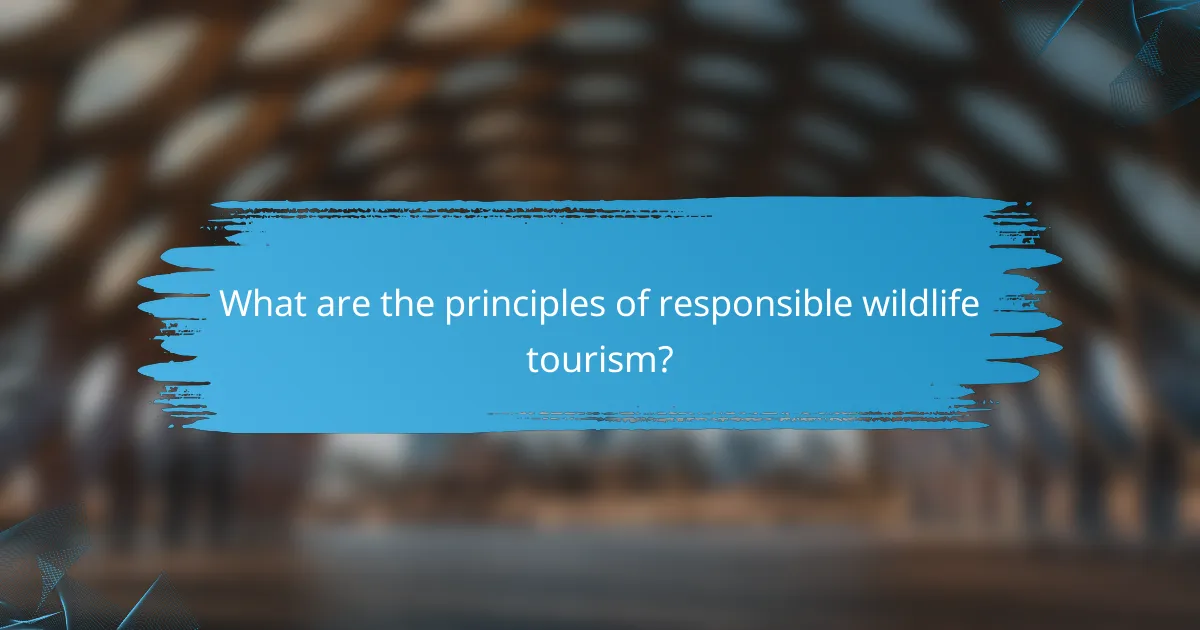
What are the principles of responsible wildlife tourism?
Responsible wildlife tourism prioritizes conservation, ethical interactions, and community benefits. Key principles include minimizing environmental impact, respecting wildlife habitats, and supporting local economies. Tourists should choose certified operators, follow guidelines, and promote awareness. Ethical considerations involve ensuring animal welfare and avoiding exploitation. These practices enhance sustainability and preserve biodiversity in Southern Europe.
How does responsible wildlife tourism benefit local communities?
Responsible wildlife tourism benefits local communities by providing economic opportunities, promoting conservation, and enhancing cultural exchange. It generates income through eco-friendly activities, creating jobs in guiding, hospitality, and local crafts. This economic boost encourages community investment in wildlife preservation, fostering a sustainable relationship with nature. Additionally, responsible tourism facilitates cultural interactions, allowing local traditions to be shared and appreciated by visitors, enriching both parties.
What role do conservation efforts play in wildlife tourism?
Conservation efforts play a crucial role in wildlife tourism by ensuring sustainable practices that protect habitats and species. They enhance the visitor experience through opportunities for wildlife observation while fostering local community engagement. Effective conservation initiatives can lead to increased biodiversity, which attracts more tourists. Additionally, they contribute to the economic benefits of the region, creating jobs and promoting responsible travel. Ultimately, conservation efforts align the interests of wildlife preservation with tourism, creating a symbiotic relationship that benefits both nature and local economies.

Which ethical considerations should travelers keep in mind?
Travelers should prioritize animal welfare, local community respect, and environmental sustainability. Responsible wildlife tourism in Southern Europe requires awareness of ethical practices to minimize harm. Engaging with certified operators ensures adherence to ethical guidelines. Additionally, avoid supporting activities that exploit animals, such as photo opportunities or performances. Respect local cultures and habitats to promote conservation efforts and benefit communities economically.
How can tourists minimize their impact on wildlife?
Tourists can minimize their impact on wildlife by following responsible practices. These include observing animals from a distance, avoiding feeding them, and staying on designated paths. Respecting local regulations and guidelines further protects habitats. Additionally, choosing eco-friendly accommodations and supporting conservation efforts contribute positively to wildlife preservation.
What are the guidelines for wildlife interactions?
To engage responsibly with wildlife, adhere to guidelines that prioritize animal welfare and ecosystem health. Avoid disturbing habitats, maintain a safe distance, and never feed wild animals. Educate yourself on local species and regulations to minimize negative impacts.
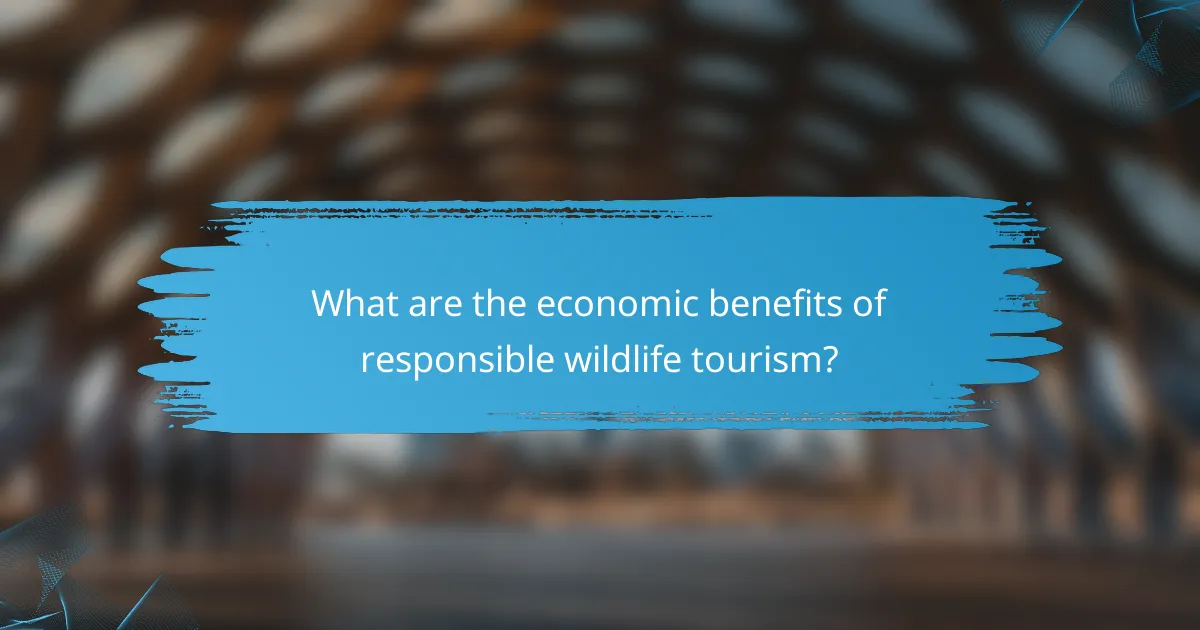
What are the economic benefits of responsible wildlife tourism?
Responsible wildlife tourism generates significant economic benefits by supporting local communities, promoting conservation efforts, and enhancing sustainable development. This sector creates jobs in guiding, hospitality, and conservation management. Local economies thrive as tourism generates revenue that can fund infrastructure and public services. Additionally, responsible practices attract more visitors, ensuring long-term economic stability. As a result, the integration of ethical considerations into wildlife tourism fosters both environmental preservation and community well-being.
How does wildlife tourism contribute to sustainable development?
Responsible wildlife tourism contributes to sustainable development by promoting conservation, supporting local economies, and enhancing environmental awareness. It encourages the protection of natural habitats and wildlife, ensuring that tourism activities do not harm ecosystems. For instance, wildlife tourism can provide funding for conservation efforts, creating a financial incentive to preserve biodiversity. Additionally, it creates jobs and supports local communities, fostering economic growth while minimizing ecological impact. Ethical considerations, such as respecting animal welfare and cultural practices, further enhance the positive effects of wildlife tourism on sustainable development.
Which regions in Southern Europe excel in responsible wildlife tourism?
Spain, Italy, and Greece excel in responsible wildlife tourism. These regions prioritize sustainable practices and conservation efforts. Spain’s Doñana National Park showcases diverse ecosystems, while Italy’s Abruzzo region emphasizes wildlife protection. Greece offers unique marine experiences in the Ionian Sea, promoting eco-friendly tourism. Each area combines natural beauty with ethical guidelines, enhancing visitor experiences and preserving wildlife.
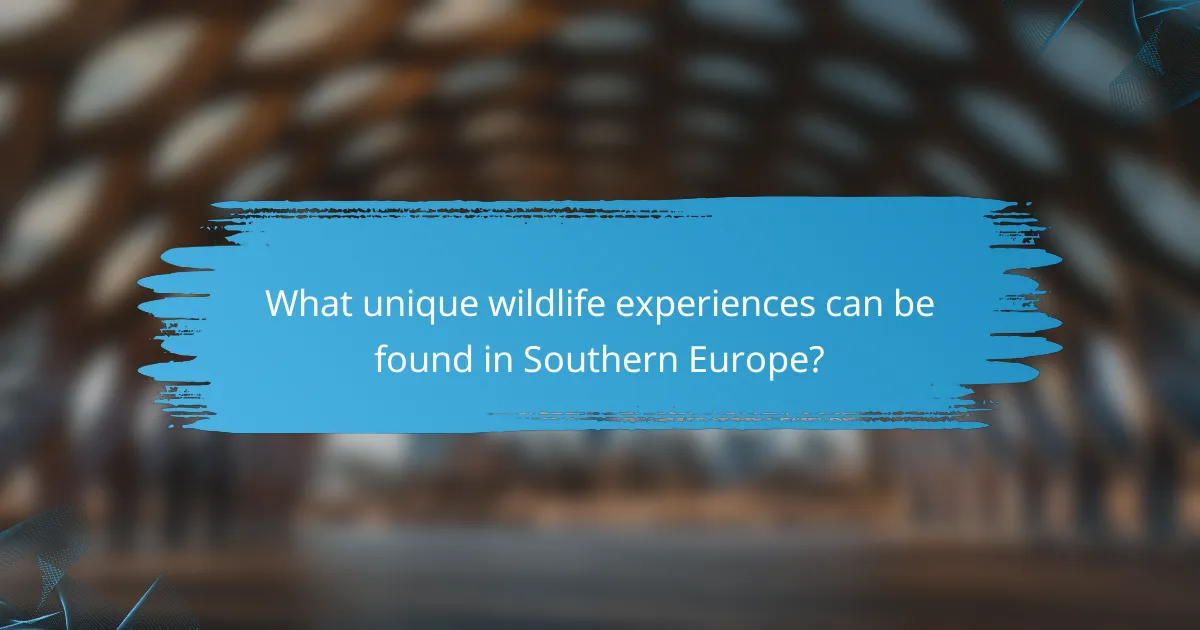
What unique wildlife experiences can be found in Southern Europe?
Southern Europe offers unique wildlife experiences through responsible tourism practices that prioritize conservation and ethical interactions. Tourists can engage in guided eco-tours in areas like the Camargue in France, where visitors can observe wild horses and diverse bird species. In Spain, the Doñana National Park showcases a variety of ecosystems, providing opportunities to see endangered species like the Iberian lynx. Italy’s Cinque Terre is renowned for its marine life, where snorkeling and diving reveal vibrant underwater habitats. These experiences contribute to local economies while promoting wildlife protection and awareness.
How do local cultures influence wildlife tourism practices?
Local cultures significantly shape wildlife tourism practices by promoting sustainable methods that respect local ecosystems. These practices often include community involvement in conservation efforts, ensuring that tourism benefits both wildlife and local populations. For instance, traditional knowledge enhances wildlife observation techniques, leading to more responsible tourism experiences. Additionally, cultural beliefs can guide ethical considerations, influencing how wildlife is perceived and interacted with. This synergy fosters a mutual respect between tourists and local communities, enhancing the overall experience while preserving biodiversity.
What are some rare wildlife species that attract tourists?
Rare wildlife species that attract tourists in Southern Europe include the Iberian lynx, the Mediterranean monk seal, and the Griffon vulture. These species offer unique experiences that promote responsible wildlife tourism. The Iberian lynx, critically endangered, showcases conservation success, while the Mediterranean monk seal, one of the rarest pinnipeds, highlights marine biodiversity. The Griffon vulture, with its impressive wingspan, draws birdwatchers and nature enthusiasts. Engaging with these species fosters awareness and supports local economies through ecotourism initiatives.
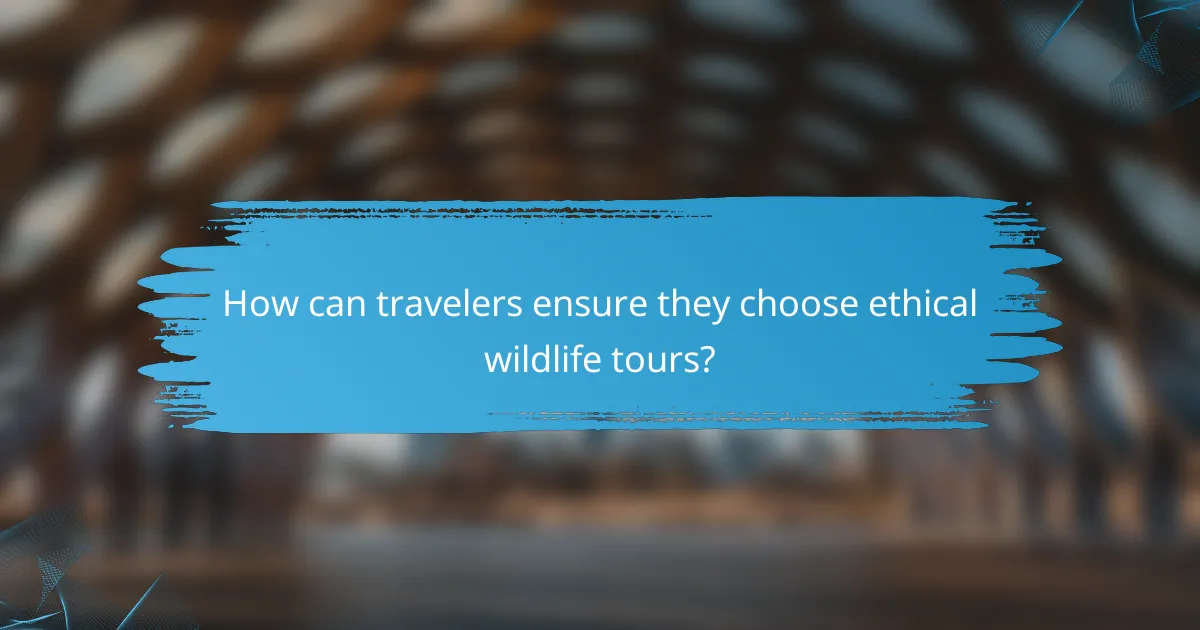
How can travelers ensure they choose ethical wildlife tours?
Travelers can ensure they choose ethical wildlife tours by researching operators, prioritizing conservation, and seeking transparency. Look for tours that support local communities and wildlife protection. Verify certifications from recognized organizations that promote responsible tourism. Read reviews and testimonials from previous travelers to gauge ethical practices.
What questions should travelers ask tour operators?
Travelers should ask tour operators about their wildlife conservation practices, animal welfare standards, and community engagement efforts. Inquire about the specific measures taken to minimize environmental impact and ensure ethical interactions with wildlife. Understanding the operator’s commitment to responsible tourism helps travelers make informed choices that support sustainable practices.
What certifications indicate responsible wildlife tourism?
Certifications indicating responsible wildlife tourism include the Global Sustainable Tourism Council (GSTC) certification, EarthCheck certification, and the Rainforest Alliance certification. These certifications ensure adherence to ethical standards, conservation practices, and community engagement. They promote sustainable tourism that minimizes environmental impact while supporting local economies.
Which common mistakes should tourists avoid when engaging in wildlife tourism?
Tourists should avoid common mistakes such as disturbing wildlife, neglecting local regulations, and not respecting habitats. Engaging responsibly enhances both the experience and conservation efforts.
1. Disturbing wildlife: Approaching animals too closely can cause stress and alter their behavior.
2. Ignoring local regulations: Each region has specific guidelines to protect wildlife; following them is crucial.
3. Feeding animals: This can disrupt natural foraging habits and lead to dependency on human food.
4. Littering: Leaving trash can harm wildlife and their habitats.
5. Not using local guides: Local experts provide insights and ensure ethical practices are followed.
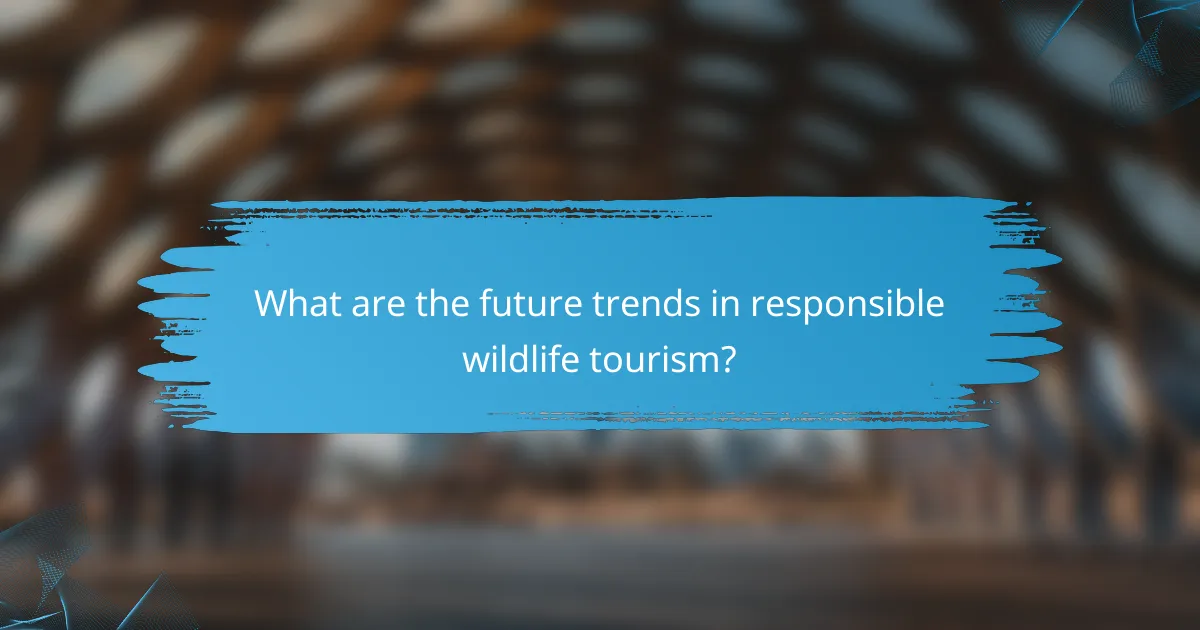
What are the future trends in responsible wildlife tourism?
Future trends in responsible wildlife tourism emphasize sustainability, community involvement, and technology integration. Increased awareness of environmental impacts drives demand for ethical practices. Tourists seek experiences that support conservation and local economies. Virtual reality and mobile apps enhance educational opportunities, promoting responsible interactions with wildlife.
How can technology enhance wildlife tourism experiences?
Technology enhances wildlife tourism experiences by improving accessibility, education, and conservation efforts. Innovations like mobile apps provide real-time information about wildlife, enhancing visitor engagement. Virtual reality experiences allow potential tourists to explore habitats without physical impact. Drones facilitate wildlife monitoring, ensuring ethical tourism practices. Additionally, online platforms promote responsible tour operators, supporting local economies while protecting ecosystems. These advancements foster a deeper appreciation for wildlife and encourage sustainable tourism practices.
What role do social media influencers play in promoting responsible tourism?
Social media influencers play a crucial role in promoting responsible wildlife tourism by raising awareness and encouraging ethical practices. They leverage their platforms to educate audiences about the benefits of sustainable tourism, such as preserving biodiversity and supporting local communities. Influencers can showcase ethical wildlife experiences, highlighting guidelines that protect animal welfare and natural habitats. Their reach and authenticity can significantly influence consumer behavior, driving demand for responsible tourism options. As a result, influencers contribute to a shift towards more conscious travel choices in Southern Europe, fostering a culture of respect for wildlife and ecosystems.
What best practices can enhance responsible wildlife tourism experiences?
To enhance responsible wildlife tourism experiences, prioritize ethical practices and community engagement. Focus on minimizing environmental impact and respecting wildlife habitats.
1. Educate tourists on local ecosystems and wildlife behaviors.
2. Encourage sustainable travel methods, such as walking or biking.
3. Support local conservation initiatives through donations or volunteer work.
4. Promote wildlife observation over direct interaction to reduce stress on animals.
5. Collaborate with local communities to develop tourism programs that benefit both visitors and residents.
6. Monitor and evaluate tourism practices regularly to ensure adherence to ethical standards.